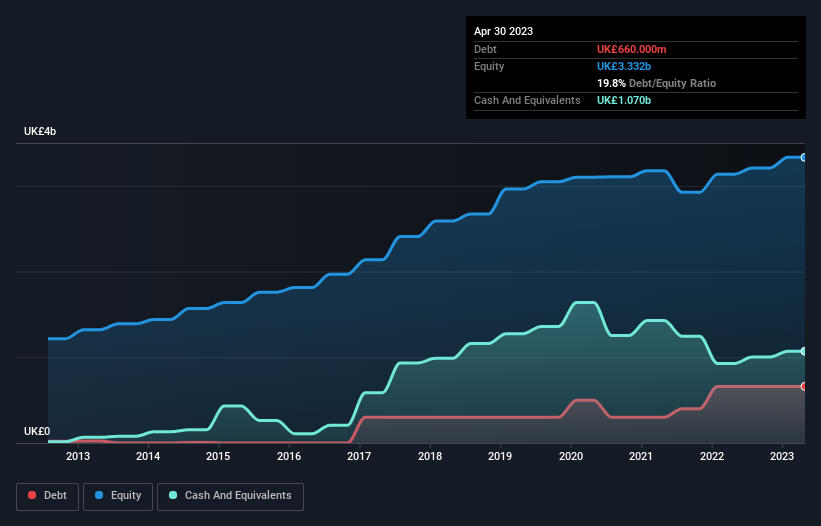- United Kingdom
- /
- Consumer Durables
- /
- LSE:BKG
Berkeley Group Holdings (LON:BKG) Has A Pretty Healthy Balance Sheet
Howard Marks put it nicely when he said that, rather than worrying about share price volatility, 'The possibility of permanent loss is the risk I worry about... and every practical investor I know worries about.' So it seems the smart money knows that debt - which is usually involved in bankruptcies - is a very important factor, when you assess how risky a company is. We can see that The Berkeley Group Holdings plc (LON:BKG) does use debt in its business. But is this debt a concern to shareholders?
What Risk Does Debt Bring?
Debt and other liabilities become risky for a business when it cannot easily fulfill those obligations, either with free cash flow or by raising capital at an attractive price. In the worst case scenario, a company can go bankrupt if it cannot pay its creditors. While that is not too common, we often do see indebted companies permanently diluting shareholders because lenders force them to raise capital at a distressed price. By replacing dilution, though, debt can be an extremely good tool for businesses that need capital to invest in growth at high rates of return. The first step when considering a company's debt levels is to consider its cash and debt together.
Check out our latest analysis for Berkeley Group Holdings
What Is Berkeley Group Holdings's Net Debt?
The chart below, which you can click on for greater detail, shows that Berkeley Group Holdings had UK£660.0m in debt in April 2023; about the same as the year before. However, it does have UK£1.07b in cash offsetting this, leading to net cash of UK£410.4m.

How Healthy Is Berkeley Group Holdings' Balance Sheet?
We can see from the most recent balance sheet that Berkeley Group Holdings had liabilities of UK£1.89b falling due within a year, and liabilities of UK£1.64b due beyond that. Offsetting these obligations, it had cash of UK£1.07b as well as receivables valued at UK£92.3m due within 12 months. So its liabilities outweigh the sum of its cash and (near-term) receivables by UK£2.36b.
Berkeley Group Holdings has a market capitalization of UK£4.12b, so it could very likely raise cash to ameliorate its balance sheet, if the need arose. But we definitely want to keep our eyes open to indications that its debt is bringing too much risk. While it does have liabilities worth noting, Berkeley Group Holdings also has more cash than debt, so we're pretty confident it can manage its debt safely.
Fortunately, Berkeley Group Holdings grew its EBIT by 2.0% in the last year, making that debt load look even more manageable. There's no doubt that we learn most about debt from the balance sheet. But it is future earnings, more than anything, that will determine Berkeley Group Holdings's ability to maintain a healthy balance sheet going forward. So if you want to see what the professionals think, you might find this free report on analyst profit forecasts to be interesting.
Finally, a business needs free cash flow to pay off debt; accounting profits just don't cut it. Berkeley Group Holdings may have net cash on the balance sheet, but it is still interesting to look at how well the business converts its earnings before interest and tax (EBIT) to free cash flow, because that will influence both its need for, and its capacity to manage debt. In the last three years, Berkeley Group Holdings's free cash flow amounted to 34% of its EBIT, less than we'd expect. That's not great, when it comes to paying down debt.
Summing Up
Although Berkeley Group Holdings's balance sheet isn't particularly strong, due to the total liabilities, it is clearly positive to see that it has net cash of UK£410.4m. And it also grew its EBIT by 2.0% over the last year. So we are not troubled with Berkeley Group Holdings's debt use. When analysing debt levels, the balance sheet is the obvious place to start. However, not all investment risk resides within the balance sheet - far from it. Case in point: We've spotted 1 warning sign for Berkeley Group Holdings you should be aware of.
When all is said and done, sometimes its easier to focus on companies that don't even need debt. Readers can access a list of growth stocks with zero net debt 100% free, right now.
Valuation is complex, but we're here to simplify it.
Discover if Berkeley Group Holdings might be undervalued or overvalued with our detailed analysis, featuring fair value estimates, potential risks, dividends, insider trades, and its financial condition.
Access Free AnalysisHave feedback on this article? Concerned about the content? Get in touch with us directly. Alternatively, email editorial-team (at) simplywallst.com.
This article by Simply Wall St is general in nature. We provide commentary based on historical data and analyst forecasts only using an unbiased methodology and our articles are not intended to be financial advice. It does not constitute a recommendation to buy or sell any stock, and does not take account of your objectives, or your financial situation. We aim to bring you long-term focused analysis driven by fundamental data. Note that our analysis may not factor in the latest price-sensitive company announcements or qualitative material. Simply Wall St has no position in any stocks mentioned.
About LSE:BKG
Berkeley Group Holdings
The Berkeley Group Holdings plc, together with its subsidiaries, builds homes and neighbourhoods in the United Kingdom.
Excellent balance sheet and fair value.
Similar Companies
Market Insights
Community Narratives



